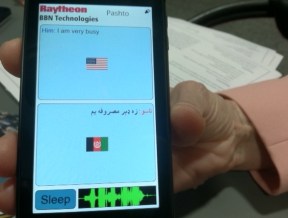If you were following along at Disrupt SF, perhaps you caught Vocre’s impressive demonstration of their near-real-time spoken translation app. As I was watching, I was picturing the gears turning behind the veneer of the app, though: the cloud transcription, translation, and speech APIs, and how there’s a nice big market for this kind of thing. Google knows it, and of course we’ve had speech on Android for a long time. Apple knows it, but took its time to release it in a more consumer-focused package.
Now even defense contractor Raytheon is getting into the game. Their TransTalk app, which has emerged from the soup of defense contracts and government research funds that is DARPA, is specifically designed for deployment in the middle east.
(more…)


 Follow
Follow
